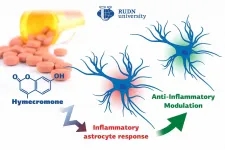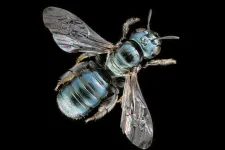Genes identified that increase the risk of obesity but also protect against disease
2021-02-26
(Press-News.org) People living with obesity tend to have unhealthy glucose and lipid levels in their blood, as well as high blood pressure. As a result, they are more at risk of cardiovascular and metabolic diseases. But scientists have observed that up to 45% of people living with obesity have healthy blood pressure and glucose and lipid levels, and therefore may not be at high risk of disease. The reason why this group of people with obesity remain healthy, has been poorly understood.
But now a team of researchers - led by scientists at the University of Copenhagen and Icahn School of Medicine at Mount Sinai, New York - have identified a range of genes that are linked to both elevated levels of body fat, as well as offering protection from some of the negative health impacts of obesity. The results were published in the journal Nature Metabolism.
Associate Professor Tuomas Kilpeläinen from the Novo Nordisk Foundation Center for Basic Metabolic Research (CBMR) at the University of Copenhagen says the findings shed new light on the biology that may disconnect higher level of body fat from higher risk of diabetes and heart disease.
"The identified genes seem to benefit our health by helping to maintain a healthy fat tissue. Some of the genes may offer targets for the development of new therapies that lower the risk of diabetes and heart disease by improving the health of our fat tissue," says Tuomas Kilpeläinen.
The scientists made the discovery by analyzing data from hundreds of thousands people who had been assessed for their body fat and disease risk markers. They identified 62 sections of the genome that were significantly associated with both high levels of body fat and lower risk of cardiometabolic diseases. Further analyses showed that the genes had a range of functions in the body, including the regulation and development of fat cells, distribution of body fat, as well as energy regulation and inflammation.
Staff Scientist Lam Opal Huang from CBMR carried out the computational analyses that identified the genes.
"We used a data-driven approach in this study, which led us to find new genes associated with fat tissue health, instead of the known obesity genes associated with central nervous system, which control satiety and are typically linked to unhealthy obesity," says Lam Opal Huang.
According to Professor Ruth Loos from the Icahn School of Medicine at Mount Sinai, this new knowledge is a step toward a more nuanced approach to treating obesity.
"Clearly, obesity is a complex disease and not every individual with excess body weight is equally at risk of developing cardiometabolic diseases. Knowing which genes protect people from developing diabetes and cardiovascular disease will eventually help us better diagnose and treat individuals with obesity."
INFORMATION:
ELSE PRESS RELEASES FROM THIS DATE:
2021-02-26
Biologists from RUDN University confirmed that a well-known spasmolytic drug called hymecromone can suppress the inflammatory response in astrocytes, important glial cells of the central nervous system. Potentially, it could be used to develop medications against Alzheimer's disease and other neurodegenerative conditions. The results of the study were published in the International Journal of Molecular Sciences.
All pathological processes in the nervous system, such as neurodegenerative diseases, injuries, or intoxications, are associated with inflammations. ...
2021-02-26
An insecticide used to control pest infestations on squash and pumpkins significantly hinders the reproduction of ground-nesting bees -- valuable pollinators for many food crops, a new University of Guelph study has revealed.
This first-ever study of pesticide impacts on a ground-nesting bee in a real-world context found female hoary squash bees exposed to imidacloprid dug 85 per cent fewer nests, collected less pollen from crop flowers and produced 89 per cent fewer offspring than unexposed bees.
"Because they're not making nests and not collecting pollen, they cannot raise offspring," said Dr. Susan Willis Chan, a post-doc in the School of ...
2021-02-26
Heart problems cause disturbed gene activity in the brain's memory center, from which cognitive deficits arise. Researchers at the German Center for Neurodegenerative Diseases (DZNE), the University Medical Center Göttingen (UMG) and the German Center for Cardiovascular Research (DZHK) come to this conclusion based on laboratory studies. They consider that they have found a possible cause for the increased risk of dementia in people with heart problems. In mice, a specific drug which is known to affect gene activity alleviated the mental deficits. The involved experts see these results as potential approaches for therapies. ...
2021-02-26
HOUSTON - (Feb. 26, 2021) - Tracking the origin of synthetic genetic code has never been simple, but it can be done through bioinformatic or, increasingly, deep learning computational approaches.
Though the latter gets the lion's share of attention, new research by computer scientist Todd Treangen of Rice University's Brown School of Engineering is focused on whether sequence alignment and pan-genome-based methods can outperform recent deep learning approaches in this area.
"This is, in a sense, against the grain given that deep learning approaches have recently outperformed traditional approaches, such as BLAST," he said. "My goal with this study is to start a conversation about how to combine the expertise of both domains to achieve further improvements for this important computational ...
2021-02-26
TORONTO, Feb. 26, 2021 - The maternal care of offspring is one of the behavioural drivers that has led some bee species to have an ever-expanding social life over the history of evolution, new research out of York University has found.
By virtue of being in a social group, the genome itself may respond by selecting more social rather than non-social genes. The behaviour and social environment come first, setting the stage for future molecular evolution.
In addition, the researchers have found that a similar genetic evolution happened independently in different species at different times, suggesting there is a unifying principle leading to the same social trait.
"There seems to be something about sociality specifically that is driving the genome to evolve in this way. It's a very ...
2021-02-26
COLUMBIA, Mo. -- Marilyn Rantz still remembers the day she got the call that her mother, whose health had been declining, had fallen and fractured her shoulder. After rushing to the hospital, her mother told her she didn't understand how she ended up on a helicopter pad after the traumatic incident. A nearby nurse told Rantz the noise from the MRI scanning tube had caused her frightened mother to mistakenly believe she had been airlifted to the hospital on a helicopter.
Determined to prevent avoidable hospitalizations, as well as the stress and panic that often comes along with the ambulance ride, Rantz, ...
2021-02-26
MEMPHIS, Tenn. - Extremely low birth weight (ELBW) infants with moderate to large patent ductus arteriosus (PDA) may benefit from transcatheter PDA closure (TCPC) in the first four weeks of life, according to research published by Le Bonheur Cardiologist Ranjit Philip, MD, and Medical Director of Interventional Cardiac Imaging and Interventional Catheterization Laboratory Shyam Sathanandam, MD. Early PDA closure may prevent early onset pulmonary vascular disease, promote growth and facilitate faster weaning off supplemental oxygen and ventilator support.
"The primary objective of this study was to describe changes in hemodynamics, ...
2021-02-26
The National Cancer Institute's Genomic Data Commons (GDC), launched in 2016 by then-Vice President Joseph Biden and hosted at the University of Chicago, has become one of the largest and most widely used resources in cancer genomics, with more than 3.3 petabytes of data from more than 65 projects and over 84,000 anonymized patient cases, serving more than 50,000 unique users each month.
In new papers published Feb. 22 in Nature Communications and Nature Genetics, the UChicago-based research team shares new details about the GDC, which is funded by the National Cancer Institute (NCI), via subcontract with the Frederick National Laboratory for Cancer Research, currently operated by ...
2021-02-26
Climate alone is not a driver for human behavior. The choices that people make in the face of changing conditions take place in a larger human context. And studies that combine insights from archaeologists and environmental scientists can offer more nuanced lessons about how people have responded -- sometimes successfully -- to long-term environmental changes.
One such study, from researchers at Washington University in St. Louis and the Chinese Academy of Sciences, shows that aridification in the central plains of China during the early Bronze Age did not cause population collapse, a result that highlights the importance of social ...
2021-02-26
URBANA, Ill. - Economists and urban planners generally agree that local pollution sources disproportionally impact racial minorities in the U.S. The reasons for this are largely unclear, but a University of Illinois study provides new insights into the issue.
"Our work finds experimental evidence that racial discrimination in the home-renting process actively sorts minority renters into neighborhoods with higher levels of pollution," says Peter Christensen, assistant professor in the Department of Agricultural and Consumer Economics (ACE) and an affiliate in Center for the Economics of Sustainability at University of Illinois.
Christensen and co-authors Ignacio Sarmiento-Barbieri, U of I, and Christopher Timmins of Duke University conducted an empirical ...
LAST 30 PRESS RELEASES:
[Press-News.org] Genes identified that increase the risk of obesity but also protect against disease




